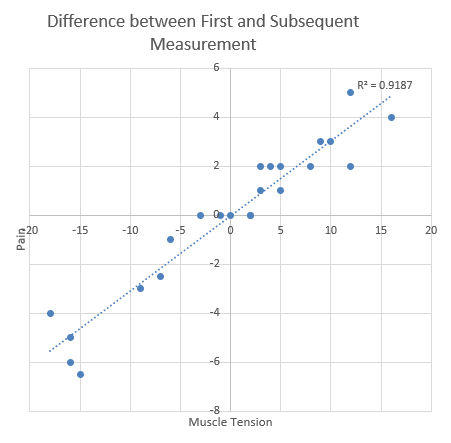Session Information
Session Type: Poster Session (Sunday)
Session Time: 9:00AM-11:00AM
Background/Purpose: Patients meeting the ACR criteria for the diagnosis of fibromyalgia were evaluated for intramuscular pressure using a pressure gauge from a trained physician or nurse. Some of these patients had a repeat muscle pressure determined using the same technique of measuring intramuscular pressure. The visual analog scale pain scores were compared and correlated with the muscle pressures.
Methods: Patients filled out a consent form after agreeing to have a repeat muscle pressure performed. A nurse or physician trained in measuring muscle pressures inserted a 22-gauge needle into the trapezius muscle, injected 0.3 cc of saline, and determined the muscle pressure using a pressure gauge. The pain score was correlated with the muscle pressure.
Results: Twenty three patients had a repeat muscle pressure done on a subsequent office visit after having an initial muscle pressure determined using the pressure gauge. The mean (SD) change in patients’ muscle pressure and pain was 0 (9.81) mmHg and -0.04 (3.14). Although some patients showed improvement in muscle tension and/or pain score between visits, and some worsened, 19/23 (83%) of patients’ change in both scales was in a consistent direction (both scales showed improvement or both scales showed worsening or both scales showed no change). In addition, when the change in muscle tension was correlated with the change in pain score, the resulting Pearson correlation coefficient was 0.9585 (R-squared 0.9187; p-value < 0.0001), indicating a very strong association between the two values. The closer a correlation coefficient or R-squared is to 1, the stronger the relationship (with 1 being a perfect correlation between two variables).
Conclusion: The data show that those patients who had less pain at a subsequent office visit also had lower muscle pressure, whereas those patients who had a similar pain score based on the visual analog scale had a muscle pressure in the same range as the initial muscle pressure determination.
These findings further demonstrate that muscle pressure correlates strongly with pain scores, and this provides additional evidence that muscle pressure may be the cause of much of the pain in fibromyalgia. Attempts to reduce muscle pressure with medication or other treatments could be successful in reducing pain in patients with fibromyalgia.
To cite this abstract in AMA style:
Katz Small A, Small B, Katz R. Repeat Muscle Pressures Measured in Fibromyalgia Patients and Compared with Pain Scores [abstract]. Arthritis Rheumatol. 2019; 71 (suppl 10). https://acrabstracts.org/abstract/repeat-muscle-pressures-measured-in-fibromyalgia-patients-and-compared-with-pain-scores/. Accessed .« Back to 2019 ACR/ARP Annual Meeting
ACR Meeting Abstracts - https://acrabstracts.org/abstract/repeat-muscle-pressures-measured-in-fibromyalgia-patients-and-compared-with-pain-scores/

